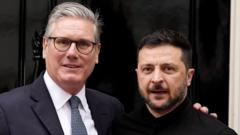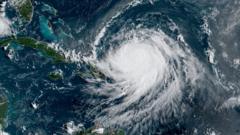What Pragmatic Support Will Starmer Offer at the Upcoming Ukraine Meeting?

Understanding the Complexities of Keir Starmer's Position on Ukrainian Peace Negotiations
The landscape of international diplomacy, particularly concerning the ongoing conflict in Ukraine, is intricate and often fraught with tension. Sir Keir Starmer, the leader of the Labour Party in the UK, has found himself at the center of this complex web. His public statements often reflect a carefully measured stance, while private discussions hint at a potentially more pragmatic approach. Understanding this dichotomy is essential for grasping the current dynamics of UK foreign policy regarding Ukraine and Russia.
Starmer's Public vs. Private Stance
One of the defining aspects of Starmer's approach is the noticeable gap between his public pronouncements and private views. Publicly, he maintains a firm stance against Russian President Vladimir Putin, emphasizing the UK's unwavering support for Ukraine's President Volodymyr Zelensky. This aligns with the broader sentiment in Westminster, where condemnation of Russian aggression has become a rallying point across political lines.
However, behind closed doors, there appears to be a recognition of the need for compromise. Reports suggest that the UK government privately contemplates a "land for peace" deal, where Ukraine might cede territory as part of a broader peace agreement with Russia. This pragmatic approach, while controversial, indicates an understanding that achieving peace may necessitate difficult concessions.
The Dynamics of Diplomatic Language
In contrast to former Prime Minister Boris Johnson's often colorful and blunt rhetoric, Starmer's diplomacy is characterized by a more reserved tone. Johnson famously referred to a meeting between Presidents Putin and Trump as "the most vomit-inducing episode in all the tawdry history of international diplomacy." Such vivid language is absent from Starmer's repertoire, as he opts for a more measured approach in addressing the complexities of international negotiations.
Key Issues in the Peace Process
As negotiations progress, several critical issues emerge that will shape the peace process between Ukraine and Russia. A UK official highlighted three key questions: the amount of land to be ceded, which specific territories are involved, and the distinction between "de facto" and "de jure" status of the land.
- How much land? This fundamental question will set the stage for negotiations. The UK government seems to accept that some territorial compromise may be necessary for peace.
- Which land? The specific territories that Ukraine might consider ceding are contentious and will undoubtedly be a focal point of discussions.
- De facto vs. De jure status: This refers to the legal recognition of territorial claims, with "de facto" indicating control and "de jure" implying formal acknowledgment by the international community.
The Role of the United States and Donald Trump
The upcoming leaders' visit to the White House is expected to be pivotal in shaping the future of peace talks. UK ministers are keen to encourage President Zelensky to engage thoughtfully with what Donald Trump may propose, especially given the tense exchanges that have occurred in the past. This cautious approach underscores the need for diplomacy that prioritizes constructive dialogue over confrontation.
One of the anticipated outcomes of this meeting is the establishment of "ironclad" security guarantees for Ukraine. UK officials believe these guarantees are crucial to ensuring Ukraine's sovereignty and stability, especially if territorial concessions are on the table. The endorsement of these security measures by Trump's envoy, Steve Witkoff, as "game changing," reflects a significant shift in the narrative surrounding US involvement in the region.
Exploring the Implications of Article 5-like Protections
Witkoff's proposal for the United States to offer protections similar to Article 5 of NATO's treaty highlights a potential shift in the US's role in European security. Article 5 establishes the principle of collective defense, meaning that an attack against one ally is considered an attack against all. This could provide Ukraine with a robust security framework, reinforcing its position in negotiations with Russia.
President Zelensky has already praised this initiative as a "historic decision," reflecting the significance of US support in the eyes of Ukraine's leadership. However, a firm commitment from President Trump regarding the US's role in these negotiations is still needed to alleviate anxieties among European allies, including the UK, France, Germany, and Italy.
Starmer’s Diplomatic Strategy
Sir Keir Starmer's strategy appears to revolve around maintaining a supportive and pragmatic stance, even as he wrestles with his own skepticism towards Putin. His ability to cultivate relationships with both Trump and Zelensky provides a unique position that he can leverage to foster dialogue and cooperation. The UK government sees his role as crucial in bridging gaps between the White House and European leaders, especially in a time of heightened geopolitical tension.
As the situation evolves, Starmer's approach may need to adapt to the changing dynamics of international relations. His focus on diplomacy, while remaining cognizant of the complexities of the situation, could prove vital in navigating the challenging landscape of Ukrainian peace negotiations.
Conclusion: Navigating the Path to Peace
The road to peace between Ukraine and Russia is fraught with challenges, and the role of leaders like Sir Keir Starmer will be critical in shaping the outcome. As negotiations unfold, the balance between public rhetoric and private pragmatism will likely dictate the success of diplomatic efforts. The UK’s position, while supportive of Ukraine, may necessitate difficult compromises that could redefine territorial claims and international relations in the region.
As we look to the future, the question remains: can a balance be struck that ensures both peace and the sovereignty of Ukraine? The coming months will be pivotal in answering this question, and the diplomatic efforts of leaders like Starmer will be essential in navigating these complex waters.
FAQs
What is the "land for peace" concept in the context of the Ukraine conflict?
The "land for peace" concept refers to the idea that Ukraine may have to cede certain territories to Russia as part of a peace agreement. This could involve areas currently under Russian military control.
How does the UK government view the role of the United States in Ukraine-Russia negotiations?
The UK government sees the United States as a crucial player in the negotiations, particularly in securing strong security guarantees for Ukraine, which may involve commitments similar to NATO's Article 5.
Why is Sir Keir Starmer’s approach to diplomacy significant?
Starmer's approach is significant because it balances a firm public stance against Russian aggression with a more pragmatic view in private discussions, allowing for a potential path toward peace that considers the complexities of international relations.
As the global community watches the developments in Ukraine, how can we ensure that diplomatic efforts prioritize not just peace but also the principles of sovereignty and justice? #Ukraine #Diplomacy #PeaceProcess
Published: 2025-08-18 12:32:02 | Category: sport



